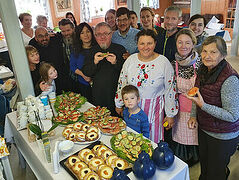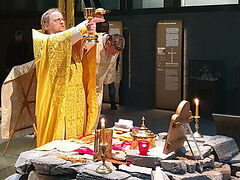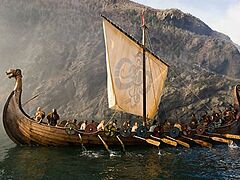Fr. Dimitry talks about the myth of Norway’s de-Christianization, the blessed time of pandemic, and the sale of bread at 350 euros per loaf.
—Is the de-Christianization of Norway a myth or a reality?
—Your question suggests that there is a certain template that we can apply to a State, society and check whether the contours of Christianity, set by the template, coincide with what we see. The question is speculative. It presupposes the existence of a Christian State with which we are comparing. There is no such State. As for the question of values, it is difficult for me to agree with the thesis that the West lives according to non-Christian values.
When we read the Gospel, we read about very specific things. A man was told: Do not commit adultery, Do not kill, Do not steal, Do not bear false witness, Defraud not, Honor thy father and mother (Mk. 10:19). And in the Gospel of Matthew: Love your enemies, bless them that curse you, do good to them that hate you, and pray for them which despitefully use you, and persecute you (Mt. 5:44). These words don’t refer to society, but to specific people—to all of us.
For the State to work, laws are created. In Norway, and throughout Europe, these laws are historically based on Christian ethics. Does this mean that all those who observe them are Christians? No. Or maybe those who don’t observe these laws are Christians? Again no. So how can we determine whether Europe has become de-Christianized or not? It’s like trying to compare unrelated measurements like weight and heat: is the fact that the State adopts non-Christian laws evidence of a greater or lesser decline of Christianity than non-observance of the laws based on Christianity? In percentage terms, the number of people attending church services in Norway is higher than in Russia. I think that the de-Christianization of Norway is a myth.
—How do you personally find the atmosphere in the country? Do you like it here or do you feel some kind of pressure? Do you consider Norway a good country to live in? Do Christians feel comfortable here?
—The atmosphere in the country is good, and frankly speaking, I like Norway. There are things that annoy me a little, but ultimately they are not very significant.
The main problem in countries with a high level of development is the “institutionalization of virtues,” as Ivan Illich1 refers to it in his book Deschooling Society. Let's take the virtue of courage. In Norway, a person doesn’t rely on his own courage or the courage of another person. He relies on the institution of the police. The place of personal justice is taken by a fair trial. Love is replaced by social services. That is why a variety of charitable projects is an important way for a person to show his humanity.
 —Is charity present in the life of your parish? Tell us about one of your projects.
—Is charity present in the life of your parish? Tell us about one of your projects.
—Sure! This is an important part of our parish life, although we are a poor parish.
Before Christmas in Norway, I accidentally learned that a Russian ship was in quarantine in the port of Bergen. The crew had contracted the coronavirus and one of the fishermen died at sea. I had a desire to deliver freshly baked bread to the ship. My daughter and I baked twenty loaves of Borodinsky bread [a dark brown sourdough rye bread of Russian origin.—Trans.] and arranged for the bread to be handed to the crew. At the same time, I made a publication on the Internet with a proposal to buy this bread from the parish and use the proceeds to buy food and everything needed for the crew. We raised over €7000 in two days! People donated money from all over Norway. But donations also came from Bulgaria, Latvia and Belarus. And it was the most expensive bread I had ever baked in my life: €350 per loaf! I realized that this was a little Christmas tale when we were all “the magi.” People needed the opportunity to show more kindness in those holy days.
—That’s amazing! What kind of bread do you bake?
 —I studied bread baking in professional training courses for bakers in Brussels. I bake all kinds of bread: French and Italian, German rye bread and Portuguese corn bread, and Baltic varieties. Borodinsky and pumpernickel2 are also excellent and among my favorites.
—I studied bread baking in professional training courses for bakers in Brussels. I bake all kinds of bread: French and Italian, German rye bread and Portuguese corn bread, and Baltic varieties. Borodinsky and pumpernickel2 are also excellent and among my favorites.
—Everything seems to go so smoothly for you. What was the most serious trial in Norway for you, your family and parish?
—I am probably too closely connected to my parish because our family trials, my personal trials and trials for the strengthening of our parish were all one simultaneous challenge for us. But that was long ago. I learned an important lesson from them.
—Does the State support Orthodox communities in the country? How are relations with the authorities in general? What happened in the relationship between parishes and the State during the pandemic?
—Until very recently, in Norway the Lutheran Church was the State Church. But our rights were not restricted by this fact in any way. On the contrary, the principle of equality has been and continues to be prevalent in Norway. This primarily concerns financial support. But in general the State is very respectful of all religions. Religious leaders, who are usually of foreign origin, are invited to specially organized courses at the Department of Theology in Oslo. Upon completion, you can receive State qualification documents. The courses are very interesting. They last a year or a year and a half and are taught by university professors. This applies not only to administrative matters (i.e. teaching the principles of democracy in decision-making in parish life) but also to pastoral practice. Because in Norway priests have always worked in hospitals. And there are a large number of scientific works related specifically to pastoral work in medical institutions, in the field of palliative medicine in particular. Now, due to the openness of society to other religions, not only Christians are taken to such positions in hospitals. In our university hospital, for example, the imam from a local mosque helps people. And any adherent of another religion has the right to invite a cleric of his faith. For this the hospital has special staff who take care of patients in this particular area. I myself have been to the hospital at the invitation of medical workers and patients—when the doctors saw that a patient was in a difficult situation, they called and invited us. Even the special, closed hospital departments where people with limited rights are kept are no exception. The State widely cooperates with religious organizations without interfering in their internal life.
The population of Norway trusts the State. Therefore, people reacted to things related to the pandemic with great understanding. If any difficulties arise, all issues are resolved thanks to organizations that defend the interests of their members, such as trade unions. The day before yesterday, the municipal authorities of Bergen invited me and some religious leaders to an online conference on the situation with the coronavirus in our city. It was a good, interesting conference, with an open discussion of the problems of religious organizations during the pandemic. As for the restrictions associated with the pandemic, we unconditionally follow the instructions of the authorities. At the same time, although the State closed churches, it left us the opportunity to celebrate services. And although people couldn’t attend the Divine Liturgy, they still could receive Communion at this difficult time. I travelled around and gave Communion to everyone who needed it at home. Some of the parishioners came to the church (we put speakers outside the church, and people could listen to the service from their cars), and I gave them Communion near the church. And I must say it was a blessed time.
—How so?
—We began to feel that we are a community united around Christ. Not language, not culture, not even an Orthodox church, but Christ around Whom we gathered.
During the pandemic a friend of mine (who also serves abroad, only in a more exotic country than Norway) sent me a note about the typicon. I love services according to the typicon. But here I thought about the following: At the Local Council of the Russian Orthodox Church of 1917-1918, the Fathers discussed the possibility or impossibility of serving the Liturgy with prosphora not made of pure wheat flour and with wine not made of grapes. A few months passed, and many of them found themselves in a situation where there were no prosphora at all, and instead of wine they had to use cranberry juice. There were no vestments, no liturgical utensils. Instead of an epitrachelion, there would be a clean rag with a cross drawn on it using the stub of a chemical pencil, and instead of a Chalice there would be a cup chained to a water tank in the barracks. And bread was the bread of life with a small “l” because the ration of bread was their life. The Eucharist was celebrated with this bread. According to the recollections of many people who were in contact with these New Confessors, after returning from camps and prisons confessors continued to celebrate in those “robes,” which served as phelonia, although they had the opportunity to sew vestments for themselves. The suffering that had befallen the Church and its members brought them back to the time when there was nothing. There was Christ and there were His disciples—the apostles. It turned out that what seemed eternal and unshakable was not so. The pandemic also made a wonderful transformation with us. We came to realize that the most important thing is a community gathered in the Name of Christ. And this community will walk with Him to the Cross. Such a community can temporarily manage without everything else. This is my personal experience during the pandemic. I talked with priests from other Local Orthodox Churches in Norway, and they said that they had experienced something similar.
—Fr. Dimitry, how are relations with representatives of other denominations and clergy of other Local Orthodox Churches developing? Are you on friendly terms?
—We maintain good relations with other denominations (Lutherans and Catholics), but we also have working relations with representatives of other faiths. We often meet at various religious forums where we discuss common problems. Norwegians are loyal to the State thanks to organizations that protect their rights. Such forums where we discuss certain decisions by the State give us the opportunity to get to know each other better. But, of course, we don’t participate in ecumenical prayer meetings.
I have already mentioned that we have several Orthodox priests in Bergen. Not only do we concelebrate with each other, our families are friends too. This is wonderful because it is another testament of our faith.
—If some of our readers decide to visit Norway, what would you advise them to see or visit in Bergen and other cities?
—Norway is a wonderful country. But it has only one significant disadvantage: high prices. This shocks not only tourists from the countries of the former USSR but also from the EU. Therefore, I would advise you to plan your trip thoroughly. The list of places to visit in Norway is endless. Bergen is a beautiful city, not far from fjords and mountains. All this, coupled with historic sites, creates an amazing harmony. If readers find themselves in Bergen, I will gladly take them on a sightseeing tour around our city.
—What are your plans for the near future?
—Our plans are simple: to pay off the loan, order an iconostasis, and have icons painted to ensure that the church acquires a traditional Orthodox look. We have already started the second part of our plans’ implementation: We have ordered, purchased and blessed a beautiful icon of the Protecting Veil of the Most Holy Lady Theotokos. It is a copy of the icon from the Holy Protection Church in Kizhi—a very warm and very large icon. Now we are raising funds to purchase an icon of the Novgorod school of Christ Enthroned (140x100 cm). It’s amazingly beautiful! This icon will be installed in the High Place.
—Thank you for the interview, Fr. Dimitry! To wrap things up, I’d like to ask you our traditional question: what words from the Holy Scriptures have especially inspired and supported you in difficult moments in your life?
—This is the greatest joy, from the Gospel of John: For God so loved the world, that He gave His only begotten Son, that whosoever believeth in Him should not perish, but have everlasting life (Jn. 3:16).






